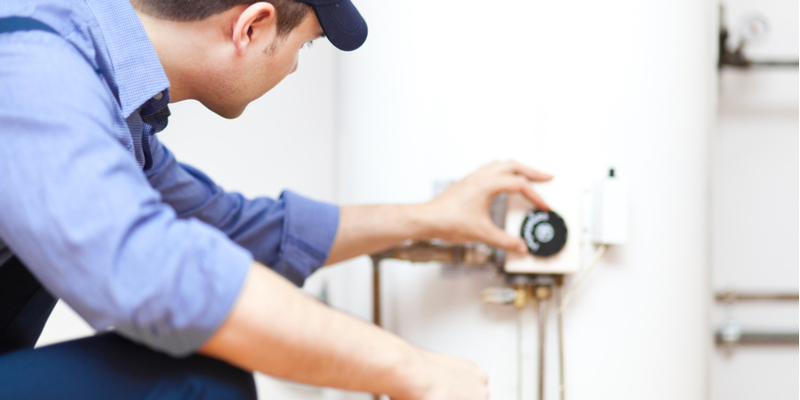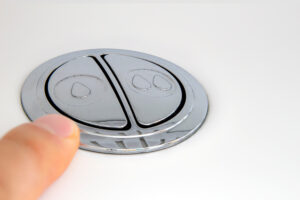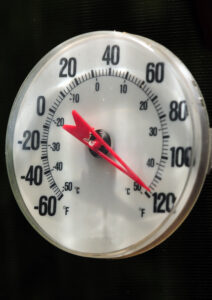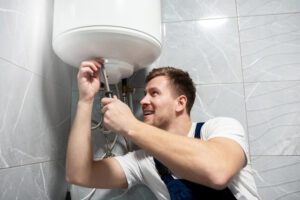
Did you know that nearly 20% of your home’s energy bill comes from simply heating up your water? Heating water requires more energy usage than almost any other household task (except for heating and cooling your whole home.) With costs that high, you’ll feel it even more if your water heater efficiency is less than stellar.
Inefficient water heaters don’t perform as well as they should and cost you more money each month. It’s a lose-lose situation that can get worse over time. Luckily, there are a few tried and true ways to improve your water heater’s efficiency. Here are five simple projects that can help your water heater work better and save you money!
Step 1: Drain Water Heater Sediment
Over time, minerals like magnesium and calcium build up in your water heater’s tank. These minerals eventually settle at the bottom of the tank and harden, forming sediment. When sediment settles in your tank, it can force the system to work unnecessarily harder to heat your water. Eventually, that extra work forces pressure to build up in the tank, causing overheating and even ruptures. You can easily drain water heater sediment by fully draining your tank and flushing it out with cold water at least once per year, (up to 3 times if you have hard water) for optimal efficiency.
Removing sediments will help your heater run much more efficiently and prevent the more costly repairs that can occur as a result of their buildup. Flushing your water heater is a relatively simple project that you can do yourself if you have the right tools. You can also hire a professional to do it as part of a larger water heater maintenance call.
Step 2: Insulate Water Pipes
Heat tends to dissipate quickly, especially in your pipes and water tank. While this is natural, it also prevents your water heater from heating as efficiently as it could. When you lose heat in your pipes, you need to heat more water in order to compensate for the loss. The more water you heat, the longer and harder your water heater runs and the more power it consumes. This means you spend more money on your electric bill. Insulating water pipes helps prevent heat loss and raises efficiency.
When you insulate your pipes, heat stays trapped inside the system where it belongs. Insulated water pipes hold heat longer and can even raise water temperature 2-4℉ on their own. Even insulating your cold water pipes can help!
Insulating your pipes and water heater is a relatively easy job if you do a little research. Just pick an insulation material, measure your pipes and get started with some tools you already have at home such as a scissors, tape measure, duct tape and gloves!

Step 3: Use Low Flow Fixtures
Low flow plumbing fixtures are another easy way to save money long term, without too much time or effort up front. Low flow fixtures do what their name suggests, they reduce the water flow rate (gallons per minute) so that less of your precious hot water goes down the drain unnecessarily.
Look into replacing items like shower heads, faucets and even toilets with low flow alternatives for the ultimate energy savings by reducing water consumption by up to 50 percent. They cost a bit more money up front but are well worth the savings in the long run, especially if you have someone in your household who is notorious for taking long, hot showers!

Step 4: Set your Water Heater to 120 Degrees Fahrenheit
Many homeowners don’t realize it, but every water heater has a built-in thermostat. This thermostat tells the system how much it needs to heat the water in the tank. The hotter your system heats your water, the longer it runs and the higher the overall energy usage. If your hot water gets hot very quickly or seems dangerously hot, you should check your water heater’s thermostat setting. Turning down your water’s thermostat will help keep your water safe while also lowering your bills.
Most manufacturers will set water heaters to 140 degrees as the default setting. In reality, water temperatures above 120 degrees are unsafe to wash or bathe with anyways. Though experts will agree that anything below 120 degrees poses a risk for bacteria to form in the settled tank water, so do be sure not to set your water heater temperature any lower than that. You can use this guide for steps on how to manually lower the temperature on your water heater by yourself at home to save 3-5% on your water bill annually!

Step 5: Fix Plumbing Leaks
Plumbing leaks are more common than you think. They also have a greater effect on your home than you might imagine. Even tiny faucet leaks waste 1,661 gallons of water (and $35 on your water bill) per year. All that wasted water affects your water heater, too. The more hot water that leaks away from your pipes, the more your water heater has to produce. That means it’s running longer and, of course, using more energy. The most common indicator of a plumbing leak is that your water heater is constantly running since it needs to replace lost hot water. So how can you identify leaks before they drain your water tank and your wallet?
Leaks that affect your water heater often start on the heater itself. Start by checking around your water heater’s tank for any visible leaks. The temperature-pressure relief valve and drain valve are particularly likely sources. The temperature-pressure relief valve may leak to release pressure (as intended) or just because it’s faulty. You should also check the water pipes themselves, especially near fixtures like sinks and showers. Remember: no leak is “too small” to leave unfixed. If you need help fixing or detecting possible plumbing leaks, call your local plumber for assistance.
Practice Regular Water Heater Maintenance
It’s easy to forget about your water heater, especially when nothing (appears) wrong with it. Even if you don’t have noticeable leaks or concerns, we recommend making sure your heater is as efficient and well-maintained as possible. It’ll save you money on your water bill now, while also helping extend the life expectancy of your water heater as a whole.
If you need help making sure your water heater works as well as it should, or if you’d like to replace or repair your water heater, schedule a service with the Mike Diamond plumbing experts today! We’re always happy to do whatever we can to make you comfortable in your home and save you money in the long run.



